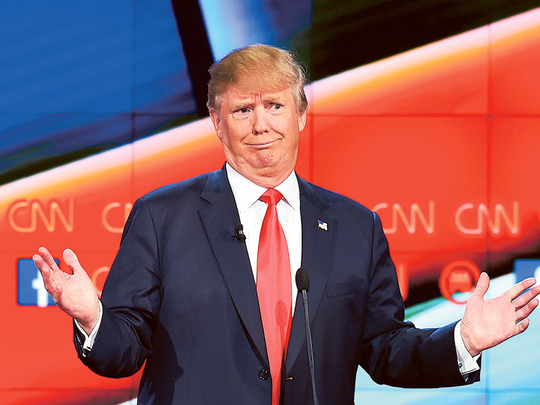
LONDON: They called him a “fool,” a “buffoon” and even a “wazzock” — English slang for a combination of the two.
Yet even as British lawmakers roundly condemned the brash Republican presidential candidate Donald Trump on Monday, with language that could have been lifted from his Twitter feed, they appeared to back away from the idea of barring him from entering the country.
A three-hour debate in Parliament on whether to bar Trump from traveling to Britain was set off by an electronic petition, signed by more than 570,000 Britons, which likened Trump to-those denied entry to the country for engaging in “hate speech.”
The petition emerged in response to Trump’s call to bar Muslims from entering the United States, something that shocked many-in-Britain, where there is much debate on community cohesion and on how to prevent radicalisation by young Muslims.
The debate on Monday, held in the Petitions Committee, touched on a range of issues, including whether Trump had breached the limits of free speech and whether he was being treated differently from others with similar views because of his wealth and his prominence.
Tulip Siddique, a Labour Party member of Parliament and a supporter of the efforts to bar Trump, described him as “a poisonous, corrosive man” who risked inflaming tensions between communities.
“Are we going to make exceptions for billionaire politicians?” she asked.
While Siddique was one of several lawmakers who derided Trump, others suggested that a visit to Britain — and perhaps a chance to sample food in immigrant neighbourhoods — might change his views.
Paul Flynn, a veteran Labour lawmaker, argued that, rather than barring Trump, it would be better to invite him to the country-and ask him to find the “so-called no-go areas” that Trump has claimed the police here fear to enter.
In December, Trump said that “we have places in London and other places that are so radicalised that the police are afraid for their own lives.”
Naz Shah, a Labour lawmaker representing Bradford West, which has a large Muslim population, described Trump as a demagogue who “panders to people’s fears.” But she voiced opposition to a ban, and said she would like to have Trump visit her constituency and eat a curry there.
The debate also included personal statements from Muslim lawmakers, including Tasmina Ahmad-Shaikh of the Scottish National Party, who said Trump had condemned all Muslims through his words, herself included.
“He’s talking about me. He’s talking about my family, my children,” she said. She described his comments as “horrendous” and argued that, through their divisiveness, they gave “succour to terrorists.”
That theme was echoed by Jack Dromey, a Labour lawmaker, who said, referring to Daesh, “In the current febrile crisis, Daesh needs Donald Trump, and Donald Trump needs Daesh.”
Dromey added: “He is free to be a fool. He is not free to be a dangerous fool on our shores.”-
In fact, British lawmakers do not have the power to bar Trump, because that authority lies with the home secretary, Theresa May. She can-prohibit people from entering the country if she decides that their presence in Britain is not conducive to the public good. The government of Prime Minister David Cameron has said exclusion powers “are very serious and are not used lightly.”
Nevertheless, Trump appears to have taken the threat seriously, and has warned that, if barred from Britain, he would withdraw his investments in Scotland, which include the Turnberry golf resort.
Sarah Malone, the executive vice president of Trump International Golf Links,-said in a statement Monday that it was “absurd that valuable parliamentary time is being wasted debating a matter raised as part of the US presidential election.
“For the UK to consider banning someone who made a statement in America, about American borders during a US election campaign, is ridiculous,”the statement added.
During the debate, parliamentary sympathy for Trump was expressed by a Conservative Party lawmaker, Philip Davies, who described him as a “politician who has the guts to stand up and say what he thinks.”
Davies added, “People are fed up of being told what they can or can’t think,” and said barring Trump from traveling to Britain would be “absolutely ridiculous.”
Edward Leigh, a Conservative lawmaker and a former minister, argued that barring Trump would probably be counterproductive.
Britain should draw a lesson, he said, from efforts to bar the far-right Dutch politician Geert Wilders from entering the country in 2009, a move that was successfully challenged amid much-publicity.
Leigh argued that keeping out Trump would simply give him what he craved: more attention and notoriety in the United States, which “would only play into Trump’s hands.”












